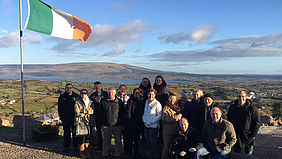SECURE, or Smarter Energy Communities in Northern & Arctic Regions, project has reached its midway transferring and implementing innovative energy solutions for housing and public infrastructure across seven Northern Periphery and Arctic regions. Project partner organisations and public institutions are now working together to develop Energy Action Plans.
Project partners have already developed a transnational low carbon services directory to carry out a knowledge transfer between the involved regions. The development of this directory has been led by Karelia University of Applied Sciences (North Karelia, Finland) and will enable regions to implement innovative services that have been previously tried and tested in other locations. It will also enable regions to avoid mistakes made by other regions. In this way, partners have already identified and collated their Good Practices to enable an interregional technology transfer, based on the needs of the partner regions. It is remarkable that this demand and supply analysis has also involved local stakeholder teams and local communities when deciding which Good Practices they wish to transfer into their own regions and implement them as new services.
Developing Energy Action Plans
SECURE partners are now exchanging experience to implement transnational low carbon actions for housing and public infrastructure. The Association of Local Authorities in Västernorrland (Sweden) is leading this action to quantify the direct impacts and potential cost savings for each energy action. Project partners are also disseminating this information to the local communities and policy makers.
The next big step will be to develop Energy Action Plans in five of the partner regions for housing and public infrastructures to plan, implement, monitor and evaluate energy actions. These EAPs will enable the implementation of measures in a structured, integrated way, allowing the systematic monitoring of efforts in achieving policy targets. Furthermore, EAPs will become an instrument for local authorities to communicate to stakeholders and to encourage local citizen participation.
Meanwhile, SECURE partners have organised the third thematic seminar of the project, ‘Low carbon policy benefits’, in County Leitrim (Ireland) to examine current and future energy policy challenges and solutions. Policy experts at a European and International level participated in this seminar to disseminate transnational good practices and to increase awareness of technologies and solutions for energy efficiency. Topics covered included energy policy, public sector energy efficiency, renewable energy solutions, community energy initiatives and implications for local economies.
In connection with the seminar, Leitrim County Council (Ireland) has hosted the fifth meeting of the project to discuss project progress, workplan, responsibilities and upcoming activities. Furthermore, project partners and stakeholders got the opportunity to experience some good local energy practices in County Leitrim. Overall, the last project meeting was very valuable for project development with the strategy to build Smarter Energy Communities reviewed.

